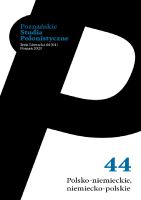Motywy faustyczne w twórczości Czesława Miłosza
Faustian Motifs in the Works of Czesław Miłosz
Author(s): Kornelia ĆwiklakSubject(s): German Literature, Polish Literature, WW II and following years (1940 - 1949), Theory of Literature, Sociology of Literature
Published by: Wydawnictwo Poznańskie Studia Polonistyczne
Keywords: Miłosz; Goethe; Faust; Faust warszawski; Warsaw Faust; Faustian motifs; Polish post-WWII literature;
Summary/Abstract: The article discusses the references to Faust by Johann Wolfgang Goethe present in the works of Czesław Miłosz. They appear in his poems, as well as in essays and non-literary texts, e.g. interviews. The references to Goethe in Miłosz’s work are also of interest, especially included in autobiographical statements. The article attempts to indicate certain regularities concerning the occurrence of intertextual references to Goethe’s tragedy, related to the poet’s worldview, his aesthetic choices and biographical context. The considerations included in the article lead to the conclusion that the hero of the tragedy symbolises the content which, after World War II, made it possible to name and understand the processes that led to the catastrophe of war and the rejection of humanity. Faust can be a tool for self-characterisation or an accusation against German culture and the cult of science and progress, leading to the alienation of the individual.
Journal: Poznańskie Studia Polonistyczne. Seria Literacka
- Issue Year: 2023
- Issue No: 44
- Page Range: 227-250
- Page Count: 24
- Language: Polish

